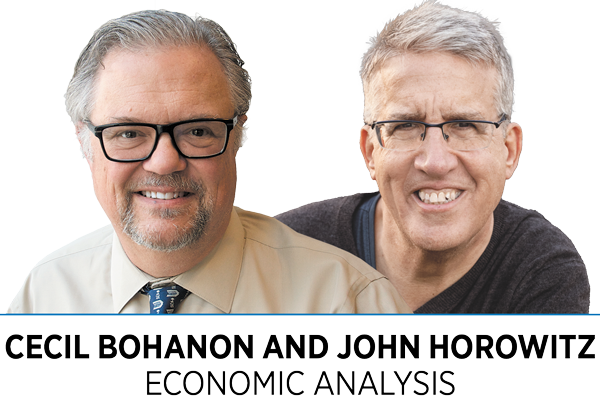Subscriber Benefit
As a subscriber you can listen to articles at work, in the car, or while you work out. Subscribe Now Thanksgiving is the time we give thanks for our blessings. And, yes, gratitude is likely a healthy habit for the mind and body. Most people express gratitude for their friends, families, associations, health, wealth and well-being. As economists, we will express our gratitude for two items that are not on most lists: money and prices.
Thanksgiving is the time we give thanks for our blessings. And, yes, gratitude is likely a healthy habit for the mind and body. Most people express gratitude for their friends, families, associations, health, wealth and well-being. As economists, we will express our gratitude for two items that are not on most lists: money and prices.
Wait! Isn’t the love of money the root of all evil? We are pretty sure the apostle Paul was referring to greed and avarice. Our point is that money facilitates wealth creation much more than a barter system ever could.
In 2023, Indiana raised some 20 million turkeys (fourth-most among the states). Under a barter system, one might persuade a Hoosier turkey farmer to exchange a turkey for five chickens or a functional desk lamp. But what if the farmer has no use for the desk lamp or chickens? We hate to think how empty our tables would be since probably few turkey farmers would exchange freshly dressed turkey for a lecture on the general principles of the elasticity of demand!
Money overcomes what economists call the “double coincidence of wants” problem of a barter system. We don’t have to offer turkey farmers other goods to obtain their wares; we simply pay the farmer, the butcher and the grocer with cash. We mostly get this cash from offering specialized services to others through our employers—in our case, lectures on the elasticity of demand, among other things. Money directs and coordinates production in a way barter could never do.
Flexible prices are also part of a functioning economy. Of course, we tend to see prices as a nuisance or barrier. How many 4-year-olds (and our academic colleagues!) have cried, “But, Mommy—why can’t everything be free?”
The answer is that without prices, there would be little reason to produce for others. Folks who know how to raise turkeys might offer a few to close friends and neighbors but not to millions of strangers. Moreover, without price, there is no good way to ration products among consumers. Demand almost always exceeds supply at a zero-money price, and it is inevitable that if the price does not ration, some other mechanism will.
Not using prices as a rationing mechanism reduces the amount available. Scarce goods will be distributed through violence, theft, favoritism, queues or some other form of rationing. Brotherly love will not prevail.
Money and prices are blessings! Happy Thanksgiving!•
__________
Bohanon and Horowitz are professors of economics at Ball State University. Send comments to [email protected].
Please enable JavaScript to view this content.
